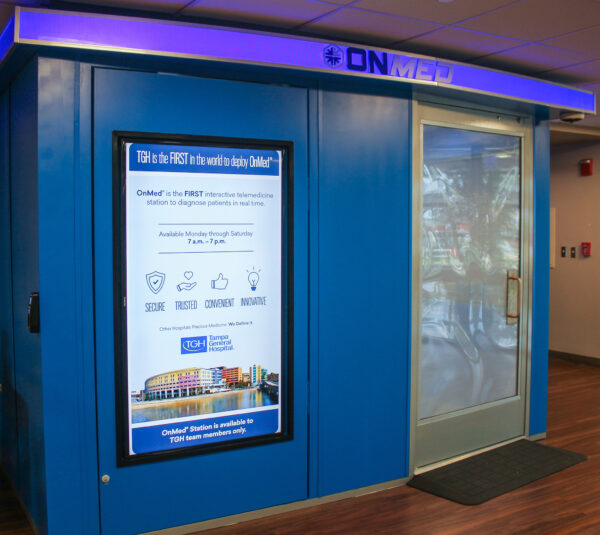
OnMed Telemedicine Station at Tampa General Hospital in Florida.
Roughly eight months after introducing a high-tech telemedicine station to the world, OnMed has found a home for its first installation: the food court at Tampa General Hospital in Florida.
On Oct. 1, the academic medical center in Tampa, Florida, became the first user of the OnMed Station, which provides telemedicine visits through audio and video technology, as well as remote diagnostics. The kiosk even features an automated pharmacy that can dispense common medications like antibiotics and antihistamines.
“That’s a game-changer in itself,” said Marion Dawkins, director of ambulatory strategy and operations at Tampa General, which employs about 8,000 people.
She estimated that at least 50 or 60 employees have gone through the OnMed Station over the last two weeks, largely for ailments like the common cold. The station is staffed remotely by providers from OnMed.
OnMed, based in Clearwater, Florida, originally unveiled its kiosks in March, capping roughly six years of development. They incorporate an exam room and various technologies to ensure patient safety and privacy, including soundproofing and privacy-preserving glass. Ultraviolet lighting keeps air and surfaces free of pathogens, while thermal imaging and other tools collect diagnostic information from patients.
“You hear telehealth station and you think, ‘I’ve seen it before,’” Dawkins said. “But really, what OnMed has done is first-ever, world-class innovative and sometimes it’s a little bit hard to realize until you see it.”

A Deep-dive Into Specialty Pharma
A specialty drug is a class of prescription medications used to treat complex, chronic or rare medical conditions. Although this classification was originally intended to define the treatment of rare, also termed “orphan” diseases, affecting fewer than 200,000 people in the US, more recently, specialty drugs have emerged as the cornerstone of treatment for chronic and complex diseases such as cancer, autoimmune conditions, diabetes, hepatitis C, and HIV/AIDS.
If it seems like you’ve seen it before, it’s because you have – at least a version. Pennsylvania-based pharmacy chain Rite Aid had partnered with a telemedicine kiosk startup — HealthSpot — until the latter went bust in 2015. In fact, HealthSpot, based in Ohio, had reportedly raised more than $40 million and had even formed a joint venture with the Cleveland Clinic before shuttering [Now Rite Aid works with another virtual care company – InTouch Health.
An executive at OnMed — Doug Smith, chief communications officer for OnMed — pushed back against any comparisons with HealthSpot.
OnMed’s kiosks differ from HealthSpot’s in that they are fully HIPAA-compliant, do not require human staff and can dispense medicine, among other factors, Smith said in an email:
“OnMed’s team also has extensive background in telehealth, which was instrumental in creating its diagnostic technology,” he countered, drawing attention to the fact that HealthSpot’s senior leadership team lacked that telemedicine experience.
Outside the U.S., a French company called HD4 offers a device known as the Consult Station, which was developed by a French doctor. According to HD4’s website, the Consult Station is being used at several locations in France and has been approved by the U.S. Food and Drug Administration. It incorporates several diagnostic tools, including a stethoscope and an electrocardiogram.
For its part, Tampa General became interested in the technology after it was recommended by one of its nurses, Krystal Solie, who is the wife of OnMed Chairman Leonard Solie, according to Dawkins. Krystal Solie mentioned OnMed’s kiosks to Tampa General’s president and CEO, John Couris, who asked two executives to explore the technology further.
“That’s how the partnership began,” Dawkins said.
The kiosk is currently available only to employees of Tampa General, a 1,007-bed academic medical center and health system. But the hospital hopes to roll out 10 to 15 additional kiosks in its surrounding communities over the next three years, Dawkins said. They could be placed in schools, airports, large businesses or other locations
“We’re currently building that strategy with OnMed as we speak,” she said.
Tampa General chose its food court as the first location for OnMed because it is a high-traffic area, ensuring people would be exposed to the kiosk. Although the kiosk is designed for self-service, OnMed has stationed a certified nurse’s aide outside it to answer any questions. Some people come for the care, others out of curiosity.
“There’s a large amount of people who don’t necessarily need a visit but who come and communicate with the CNA and ask questions about the partnership,” Dawkins added.
The CNA also does a quick survey of people who actually use the station, Dawkins added. So far, users have given it four or five stars on a five-star scale. The hospital also is collecting more detailed data so it can make suggestions for potential changes.
“As a partner, we’re making sure everything works as it should, and it has,” Dawkins said. “We’re just kind of, in a way, pressure-testing it.”
The hospital also offers its employees telemedicine services through American Well, Dawkins said. That company offers traditional video and audio connections, which employees can access at home through their phones or computers.[But American Well has kiosks as well.]
The automated pharmacy, which is part of the OnMed telemedicine station, was stocked based, in part, on data for prescriptions taken out via telemedicine visits through American Well, Dawkins said. But the hospital is tracking the medications doled out via OnMed in case it needs to fine-tune what is stocked in the kiosk.
OnMed had initially said its first stations would be installed in northern Mississippi. But the company’s partner there was not ready for the technology, Smith said. While exploring other partnerships locally and globally, the partnership with Tampa General materialized.
“We look for world-class organizations to partner with and it just so happens that one was just on the other side of Tampa Bay, and that was fortuitous for both of us,” Smith said.
Photo: OnMed













